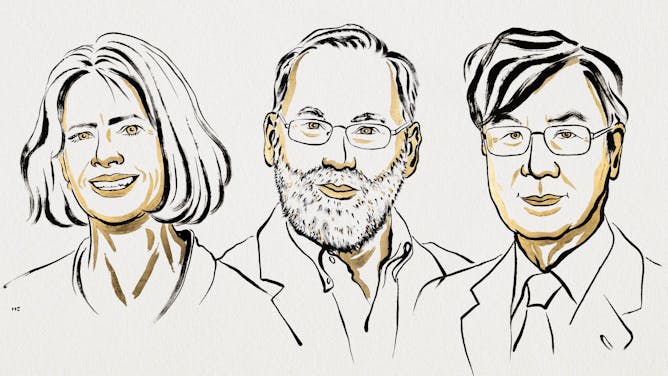|
A trio of scientists has won the Nobel Prize in medicine for their breakthrough work on understanding how our immune systems function.
Their findings helped boost the hunt for new treatments for cancers and have been important for understanding autoimmune conditions. Tracy Hussell unpacks the discoveries of Shimon Sakaguchi, Mary E. Brunkow and Fred Ramsdell.
Today marks the 2nd anniversary of the brutal terror attack by Hamas in southern Israel in which 1,195 people were killed and 251 taken hostage. As Simon Mabon writes, the destructive reverberations of events that day have been felt across the entire Middle East as Israeli forces have sought to assert unilateral dominance.
And while US President Donald Trump’s 20-point plan to enact a ceasefire has the potential to be an impressive feat of diplomacy, it rings hollow as a feat of peace building.
|

Tracy Hussell, University of Manchester
The discovery of cells that prevent the immune system from hurting the body is paving the way for new treatments for autoimmune diseases and cancer.
|

Simon Mabon, Lancaster University
The impact of the October 7 attacks and Israel’s response will reverberate for decades to come.
|
|
|
-
Aimee Pugh Bernard, University of Colorado Anschutz Medical Campus
Regulatory T cells help your immune system distinguish between ‘self’ and ‘nonself’ – and can open doors to better treatments for cancer, autoimmune disease and transplant rejection.
-
Melanie O'Brien, The University of Western Australia
An expert on international law and genocide explains.
-
Ted Powers, University of California, Davis
Cancer. Diabetes. Aging itself. Rapamycin’s potential to treat an array of diseases has been a source of scientific fascination. But many aren’t aware of its origins – and its complicated legacy.
-
Christopher P. Davey, Binghamton University, State University of New York; Claudine Kuradusenge-McLeod, American University; Judith Rafferty, James Cook University; Nicole Fox, California State University, Sacramento; Samantha Lakin, UMass Boston; Stephanie Wolfe, Weber State University
Six scholars with experience in 15 countries provide lessons on best practices for documenting atrocities and elevating the voices of victims and survivors.
-
Yeimy J. Rivera, Smithsonian Institution; Rosa Tatiana Niembro Hernández, Smithsonian Institution; Samuel Badman, Smithsonian Institution
Space weather isn’t referring to rain clouds that float through the galaxy. Instead, it’s caused by massive explosions of particles that shoot out from the Sun.
-
Dan Paget, University of Sussex
President Samia Hassan is relying on repressive tactics to eliminate her most significant competitors from the 2025 presidential race.
-
Christopher Watson, Queen's University Belfast; Annelies Mortier, University of Birmingham
In the 30 years since the discovery of 51 Pegasi b, more than 6,000 planets outside our Solar System have been catalogued. Two modern-day explorers explain how.
|
|